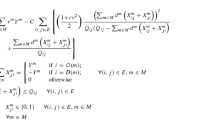Abstract
This paper deals with the multi-hour bandwidth packing problem in telecommunication networks. The problem consists of selecting calls from a list of requests with time varying traffic conditions to be routed on an arc-capacitated network in order to maximize profit. Response time to users is considered by specifying an upper limit on the queueing delay in the network. The paper represents a significant improvement over previous research by presenting a unified model of the problem that considers all possible paths for each call, allows the traffic requirements of the calls to vary over the busy-hours of the day and integrates quality of service to users. A mathematical programming formulation for the problem is presented. A Lagrangean relaxation based heuristic solution procedure is developed. The results of extensive computational experiments over a wide range of problem structures indicate that the procedure is both efficient and effective.
Similar content being viewed by others
References
A. Amiri and R. Barkhi, The multi-hour bandwidth packing problem, Computers and Operations Research 27 (2000) 1–14.
A. Amiri, E. Rolland and R. Barkhi, Bandwidth packing with queueing delay costs: Bounding and heuristic solution procedures, European Journal of Operational Research 112 (1999) 635–645.
C.A. Anderson, K. Fraughnaugh, M. Parkner and J. Ryan, Path assignment for call routing: An application of tabu search, Annals of Operations Research 41 (1993) 301–312.
M.S. Bazaraa and J.J. Goode, A survey of various tactics for generating Lagrangean multipliers in the context of Lagrangean duality, European Journal of Operational Research 3 (1979) 322–328.
L. Cox, L. Davis and Y. Qui, Dynamic anticipatory routing in cuircuit-switched telecommunications networks, in: Handbook of Genetic Algorithms, ed. L. Davis (Van Norstrand/Reinhold, New York, 1991).
B. Gavish, On obtaining the ‘best’ multipliers for a Lagrangean relaxation for integer programming, Computers and Operations Research 5 (1978) 55–71.
B. Gavish and K. Altinkemer, Backbone network design tools with economic tradeoffs, ORSA Journal on Computing 2 (1990) 226–252.
B. Gavish and I. Neuman, A system for routing and capacity assignment in computer networks, IEEE Transactions on Communications 37 (1989) 360–366.
M. Gerla, The design of store-and-forward (S/F) networks for computer communications, Ph.D. dissertation, Computer Science Department, University of California, Los Angeles, 1973.
M. Gerla, A. Monreiro and R. Pazos, Topology design and bandwidth allocation in ATM nets, IEEE Journal on Selected Areas in Communications 7 (1989) 1253–1262.
L. Kleinrock, Communications Nets: Stochastic Message Flow and Delay (Dover, New York, 1964).
L. Kleinrock, Queueing Systems, Vols. 1, 2 (Wiley–Interscience, New York, 1975/1976).
M. Laguna and F. Glover, Bandwidth packing: A tabu search approach, Management Science 39 (1993) 492–500.
J. Monreiro and M. Gerla, Bandwidth allocation in ATM networks, Annals of Operations Research 49 (1994) 25–50.
K. Park, S. Kang and S. Park, An integer programming approach to the bandwidth packing problem, Management Science 42 (1996) 1277–1291.
M. Parker and J. Ryan, A column generation algorithm for bandwidth packing, Telecommunication Systems 2 (1995) 185–196.
B.T. Poljack, A general method of solving extremum problems, Soviet Math. Doklady 8 (1967) 593–597.
E. Rolland, A. Amiri and R. Barkhi, Queueing delay guarantees in bandwidth packing, Computers and Operations Research 26 (1999) 921–935.
M.M. Syslo, N. Deo and J.S. Kowalik, Discrete Optimization Algorithms with Pascal Programs (Prentice-Hall, Englewood Cliffs, NJ, 1983).
Author information
Authors and Affiliations
Rights and permissions
About this article
Cite this article
Amiri, A. The Multi-Hour Bandwidth Packing Problem with Response Time Guarantees. Information Technology and Management 4, 113–127 (2003). https://doi.org/10.1023/A:1021832618060
Issue Date:
DOI: https://doi.org/10.1023/A:1021832618060




